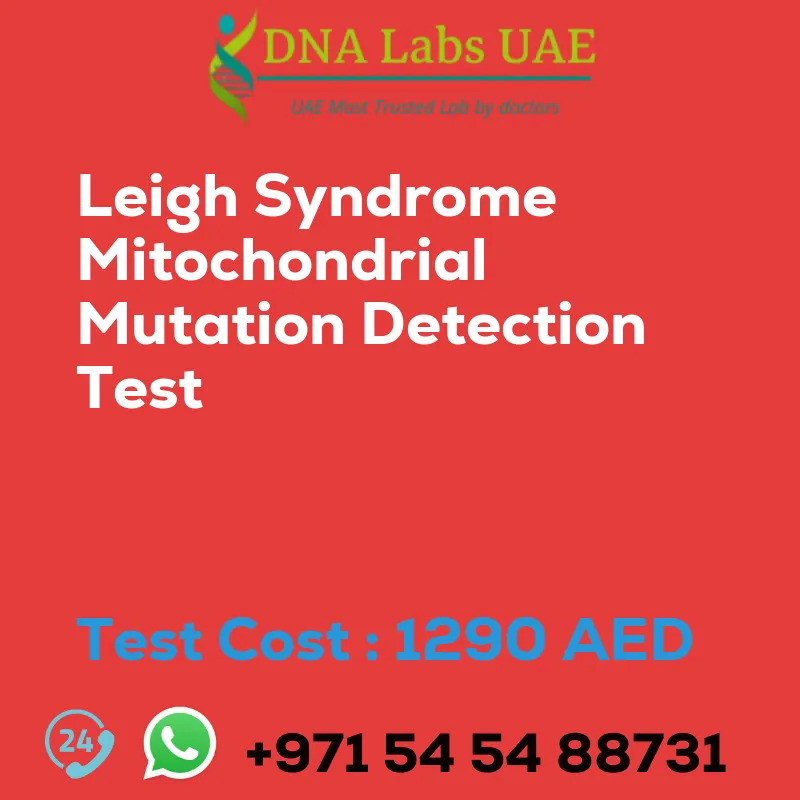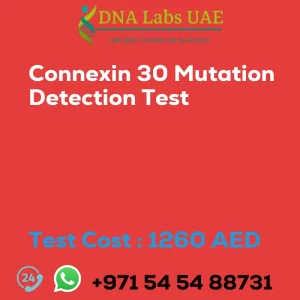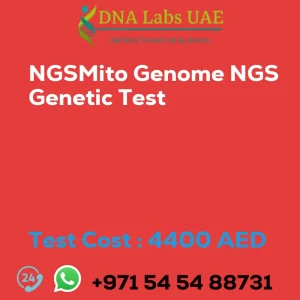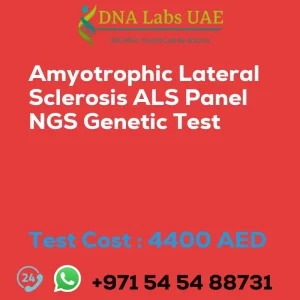LEIGH SYNDROME MITOCHONDRIAL MUTATION DETECTION Test
Test Cost: AED 1290.0
Symptoms, Diagnosis, and Test Details
Leigh Syndrome Mitochondrial Mutation Detection Test is a genetic test offered by DNA Labs UAE. This test is designed to detect mutations in the mitochondrial DNA that are associated with Leigh syndrome, a rare and severe neurological disorder.
Leigh syndrome typically begins in infancy or early childhood and is characterized by progressive loss of mental and movement abilities. The disorder is caused by dysfunction of the mitochondria, which are the energy-producing structures within cells. Mutations in the mitochondrial DNA can lead to this dysfunction and result in a wide range of symptoms.
The Leigh Syndrome Mitochondrial Mutation Detection Test involves analyzing a sample of DNA, usually obtained from a blood sample, to identify specific mutations in the mitochondrial DNA that are known to be associated with Leigh syndrome. This test can help confirm a diagnosis of Leigh syndrome in individuals who exhibit symptoms of the disorder.
It is important to note that this test is specific to Leigh syndrome and will not detect mutations associated with other mitochondrial disorders. Additionally, not all cases of Leigh syndrome are caused by mitochondrial mutations, so a negative test result does not rule out the possibility of the disorder.
Test Components and Method
The LEIGH SYNDROME MITOCHONDRIAL MUTATION DETECTION Test includes the following components:
- Test Name: LEIGH SYNDROME MITOCHONDRIAL MUTATION DETECTION
- Price: AED 1290.0
- Sample Condition: 4 mL (2 mL min.) whole blood in 1 Lavender top (EDTA) tube. Ship refrigerated. DO NOT FREEZE.
- Report Delivery: Sample Mon by 9 am; Report Fri
- Method: PCR, Sequencing
- Test Type: Disorders of Nervous system
- Doctor: Neurologist
- Test Department: MOLECULAR DIAGNOSTICS
- Pre Test Information: Duly filled Genomics Clinical Information Requisition Form (Form 20) is mandatory.
Genetic Counseling and Family Planning
Genetic testing for Leigh syndrome can also be used to identify carriers of the mutations in families with a history of the disorder. This information can be useful for family planning and genetic counseling.
In conclusion, the LEIGH SYNDROME MITOCHONDRIAL MUTATION DETECTION Test offered by DNA Labs UAE is a valuable tool in the diagnosis and management of Leigh syndrome. It provides important genetic information for individuals and families affected by the disorder.
| Test Name | LEIGH SYNDROME MITOCHONDRIAL MUTATION DETECTION Test |
|---|---|
| Components | |
| Price | 1290.0 AED |
| Sample Condition | 4 mL (2 mL min.) whole blood in 1 Lavender top (EDTA) tube. Ship refrigerated. DO NOT FREEZE. Duly filled Genomics Clinical Information Requisition Form (Form 20) is mandatory. |
| Report Delivery | Sample Mon by 9 am; Report Fri |
| Method | PCR, Sequencing |
| Test type | Disorders of Nervous system |
| Doctor | Neurologist |
| Test Department: | MOLECULAR DIAGNOSTICS |
| Pre Test Information | Duly filled Genomics Clinical Information Requisition Form (Form 20) is mandatory. |
| Test Details |
The Leigh Syndrome Mitochondrial Mutation Detection Test is a genetic test used to detect mutations in the mitochondrial DNA that are associated with Leigh syndrome. Leigh syndrome is a rare and severe neurological disorder that typically begins in infancy or early childhood and is characterized by progressive loss of mental and movement abilities. Mitochondrial DNA (mtDNA) is a type of genetic material that is found in the mitochondria, which are the energy-producing structures within cells. Mutations in mtDNA can lead to dysfunction of the mitochondria, resulting in a wide range of symptoms, including those seen in Leigh syndrome. The Leigh Syndrome Mitochondrial Mutation Detection Test involves analyzing a sample of DNA, usually obtained from a blood sample, to identify specific mutations in the mitochondrial DNA that are known to be associated with Leigh syndrome. This test can help confirm a diagnosis of Leigh syndrome in individuals who exhibit symptoms of the disorder. Genetic testing for Leigh syndrome can also be used to identify carriers of the mutations in families with a history of the disorder. This information can be useful for family planning and genetic counseling. It is important to note that the Leigh Syndrome Mitochondrial Mutation Detection Test is a specific test for Leigh syndrome and will not detect mutations associated with other mitochondrial disorders. Additionally, not all cases of Leigh syndrome are caused by mitochondrial mutations, so a negative test result does not rule out the possibility of the disorder. Overall, the Leigh Syndrome Mitochondrial Mutation Detection Test is a valuable tool in the diagnosis and management of Leigh syndrome, providing important genetic information for individuals and families affected by the disorder. |








